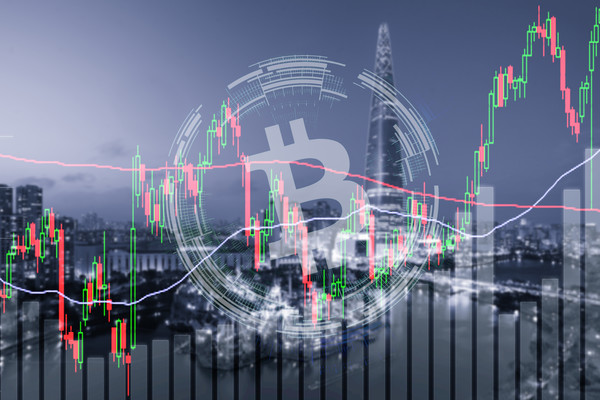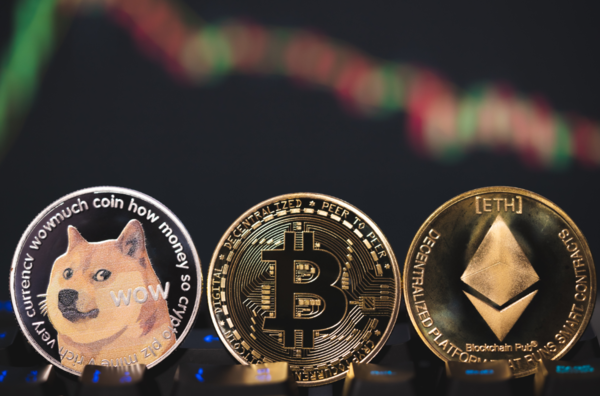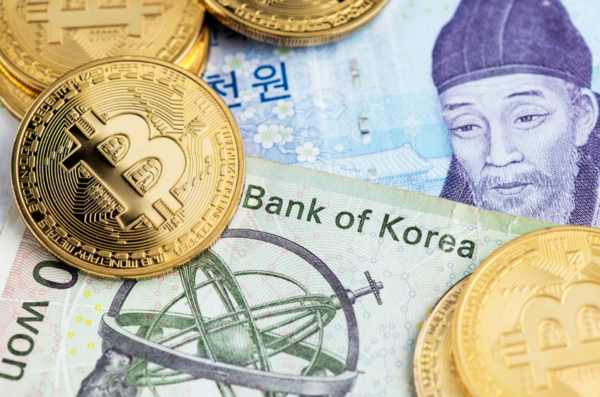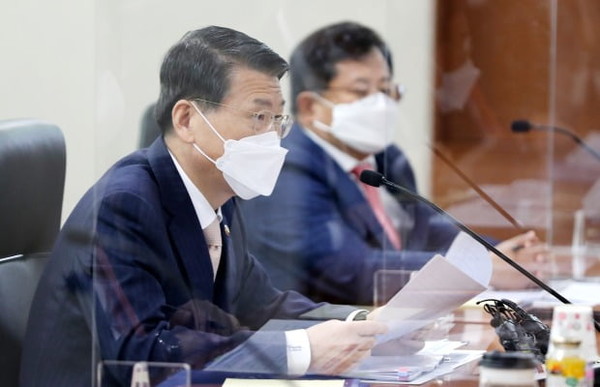
Virtual cryptocurrencies are gradually replacing real money worldwide. The cryptocurrency craze is also blowing up in Korean society, especially among young people. According to the Financial Services Commission (FSC), the four major cryptocurrency exchanges, Bithumb, UPbit, Korbit and Coinone, had 2,495,000 new subscribers in the first quarter of this year, 32.7% in their 20s and 30.8% in their 30s, accounting for more than half of all subscribers. Korea’s cryptocurrency transactions have already surpassed the size of the stock market. As of April 23rd, the trading price of Korea's four largest cryptocurrency exchanges was 28.4375 trillion won, far higher than that of KOSPI (15.3876 trillion won). However, there has yet to be a social consensus on whether cryptocurrency can be recognized as an official currency. In particular, the Korean government has declared that cryptocurrency is not a currency, and it will not protect cryptocurrency investors. However, there are also voices of criticism against the government’s conservative response in the current situation where the size of the cryptocurrency market has grown so large. What are the problems surrounding cryptocurrency in Korea?
What Is Cryptocurrency?

Cryptocurrency is based on blockchain technology, also called “public account.” Usual trading goes through central institutions, such as banks. To send money to others, the bank, which is the broker of the transaction, checks if there is money in the sender's account and transfers the money to others. The only witness to the transaction in this process is the bank. On the other hand, in blockchain trading, everyone who uses blockchain technology is witness to transactions and therefore personal transaction without a bank’s intervention is possible. Therefore, the feature and advantage of blockchain, are that it costs little to make a transaction. Take an example of A sending 10,000 won to B. When this happens, it records the fact that "A sent 10,000 won to B." This record is called ‘block,’ and the accumulation of blocks is called ‘chain.’ So, it is called the blockchain. Of course, this is not done by the users themselves, as their computers automatically process it. The most widely known Bitcoin, was the first cryptocurrency created by this technology. Unlike ordinary financial institutions that store transaction history on a central server, Bitcoin stores transaction history on all users' computers using blockchain technology. Bitcoin's biggest feature is that it has a distributed network, not a centralized one, and therefore it has high safety in that hackers should attack ‘all’ computers. Bitcoin has accumulated all transactions that have been made since its birth in January 2009.
Currencies are issued by the central bank exclusively, but cryptocurrency can be issued by anyone by decrypting coins. This is called “mining.” In particular, since many source codes, the blueprint of cryptocurrency, are now open to the market, it is easier to mine cryptocurrency than before. “As a result of disclosing everything to secure trust, many people are using this information to create coins,” explained Kim Hyoung-joong at Korea University School of Cybersecurity. Types of coins include Bitcoin, which was the first, and biggest coin traded so far, as well as Ethereum Classic, Ripple, Lightcoin, and many more. The popularity of Dogecoin, which was invented by software engineers in the U.S. based on image of a Shiba Dog in Japan, which was popular as an Internet meme material, is also skyrocketing recently. Cryptocurrency investors can store, remit, and deposit the coin through an electronic wallet called a “coin wallet.” In particular, it is useful for overseas remittances or micropayments because the transaction costs, or fees, are very low. The return on investment through cryptocurrency largely includes profits from coin trading and profits from coin mining. These cryptocurrency transactions can be made through direct transactions between individuals, but most people trade through cryptocurrency exchanges such as Bithumb and UPbit.
Issues Surrounding Cryptocurrency
Value as Money

The three characteristics of traditional money are the medium of exchange, the criterion of value, and the storage of value. Money must have enough universal value to be worth trading, have enough quantity to be used universally, and should be stable enough to be stored. In other words, the volatility of value should be low. However, there is a consensus between experts that cryptocurrency does not have these three characteristics. First, it did not have universal value enough to be subject to barter. Experts such as economists have different criteria for evaluating the value of cryptocurrency, and some of them do not recognize its value. Also, there is not enough quantity for public use. The number of Bitcoins issued over the next 100 years is limited to a total of 21 million. This reduces supply every four years. Above all, the most problematic thing when using cryptocurrency as real currency is price volatility. Based on the characteristic that everyone can issue money, the value of cryptocurrency is highly variable because it is determined by the whim of its participants. It is a typical “high risk-high return” type of investment. Therefore, the risk of speculation is also very high. "It is clear that virtual currency has a nature of assets, but it is difficult to see it as currency due to extreme price volatility,” pointed out Sung Tae-yoon, an economics professor at Yonsei University.
Cryptocurrency Speculation Using Kimchi Premium
Unlike stocks, cryptocurrencies are not traded at a single price on all exchanges, but at different prices depending on demand and supply by each exchange. Prices of cryptocurrencies are more expensive in Korea than in other countries—a phenomenon commonly referred to as the “kimchi premium”. Using this kimchi premium, some buy cryptocurrency at a relatively low price on foreign exchanges, selling it at a high price on the Korean exchange, and transferring the money back to their own country. As a result, foreign currency outflow is feared in Korea. In fact, the Korea Customs Service (KCS) uncovered 10 organizations of illegal foreign exchange transactions in April that bought Bitcoin cheaply in China and sold it at high prices in Korea. An official from the KCS said, "This is an example of using the kimchi premium, and the amount of money they illegally traded was 1.4 trillion won." As a result, Korean banks are responding by setting a limit on overseas remittances. Woori Bank established a monthly limit of 10,000 dollars for its overseas remittance service to China. Designating April to June as a period of an intensive crackdown on cryptocurrency transactions, the government also decided to strongly monitor abnormal cryptocurrency transactions and illegal investments. However, experts pointed out that Korea’s regulations on cryptocurrency, which are cut off from international trends, are the cause of the kimchi premium. The reason why the kimchi premium is created is because of insufficient supply compared to the demand to buy cryptocurrency. In Korea, cryptocurrency mining is not as active as in other countries. Therefore, it should rely on supply of cryptocurrencies purchased from foreign countries. However, supply shortages continue because the government restricts remittances for cryptocurrency transactions. "According to market principles, the kimchi premium phenomenon can be resolved as cryptocurrency supply increases when the transaction is active. But it is not resolved as the government is tightening regulations on transactions due to concerns over foreign currency outflow,” said Park Sung-joon, head of Blockchain Research center at Dongguk University.
Financial Authorities' Conservative Stance on Cryptocurrency

Financial regulators declared that the government could not protect cryptocurrencies. The FSC chairman Eun Sung-soo on April 22nd voiced concern about the recent cryptocurrency frenzy, saying “a cryptocurrency is a crypto asset with no intrinsic value and is a highly speculative investment…I don't think we should protect the market just because there are many investors," he said. He made his claim clear that cryptocurrency investments are immature investments of young people, by adding that “adults are responsible for leading young people who are going the wrong way.” In addition, regarding the government's plans to levy a 20% income tax on cryptocurrency transactions from next year, he said, "Even if we buy and sell pictures, we pay taxes if there is a difference in transfer price. I think the finance ministry made such a law out of the idea that where there is income, there is tax." He also warned of the risk of investment in cryptocurrency. He said many cryptocurrency exchanges have yet to receive the Virtual Asset Service Provider (VASP) applications required under a recently amended Financial Transactions Reporting Act. “If the current situation continues then all of them could be shut down,” he said. The amended legislation requires cryptocurrency exchanges to resister VASPs with financial authorities. Currently, there are only four domestic exchanges that have gone through this process: Bithumb, Korbit, UPbit, and Coinone. As the government sent a warning message to the cryptocurrency market, coin prices were adjusted. Prices of Bitcoin, which rose to 80.73 million won on April 13th, fell to 65.93 million won on the 22nd, when Chairman Eun made his remarks. Deputy Prime Minister Hong Nam-ki also said on April 27th, "The government uses the term of virtual asset instead of cryptocurrency and virtual currency,” adding, “Virtual assets are risky assets because their price volatility is very large."
“Bring Cryptocurrency into the Financial System.”
Contrary to the government's position, voices are rising that cryptocurrency should be brought into the legal system so that the investors can be protected. Yi Jong-goo, chairman of industry self-regulation committee at the Korea Blockchain Association said, "the market continues to grow to reach tens of trillions of won a day, but there is still a lack of laws and regulations on virtual assets," adding, “the government has only warned against investing in virtual assets. But this is not enough.” It is true that more and more people, especially the younger generation, are jumping into the cryptocurrency market. Among them, we can often find people who show symptoms of crypto addiction. In an interview with Maeil Economy on April 23rd, citizens replied, "I can't save banks or buy stocks anymore after seeing high returns easily since I started coin investment," “Watching people who look at the real-time chart of cryptocurrency all day long, I feel like coin is devouring everything in their life.” This coin craze seems an irreversible phenomenon, and coin investment feels to be the only hope for some younger generations. That is why the government’s protection for crypto investors is inevitable. Many argue that cryptocurrency investment is the only social ladder for those in their 20s and 30s. "Many young people cannot move up classes through traditional investment methods such as stocks or real estate. […] Looking for a way to make a lot of money with small amounts of money, many people have flocked to coin investment." said Yoon So-pyeong, a lawyer. Oh Yeong-hwan, a lawmaker of the Democratic Party (DP) also said, "We need to understand why many people, including young people, have invested in virtual assets. Job insecurity, rising housing prices, and the hopelessness of an unstable future for income are important reasons that made them rely on the dangerous possibility of making a fortune."
In addition to this social reality, the government needs to take an active response regarding the fact that cryptocurrency using blockchain technology is a new trend of the times. Lee Kwang-jae, a lawmaker of the DP, said, "The world of young people is an era where new technologies such as Artificial Intelligence or blockchain are combined. Older generations should not prevent young people's futuristic investing." Although there is a clear risk in Bitcoin and it is necessary for the government to prevent illegal activities, the government's warning message to investors may not be effective as the virtual asset market grows. Economic analyst Jeong Cheol-jin pointed out that "The key is that too many people have jumped into the cryptocurrency market, and the big banks such as JP Morgan and Goldman Sachs, are trying to analyze cryptocurrencies and participate in crypto market.” And he explained, “In one part, the government regulates cryptocurrency investment but in the other part, more and more people are participating in the market. Therefore, due to this dual appearance, the public does not take the government's warning message seriously.”
The Korean government seems to be in a dilemma over cryptocurrency. It should consider the ripple effect of hastily bringing cryptocurrencies, which lack important characteristics of a formal currency, into the legal system. But at the same time, that doesn't mean the government can just sit on the sidelines of the largely growing market. Anyway, it seems very important to respond appropriately as times change. The government should make efforts to create a sound investment culture in the cryptocurrency market and to ensure that the blockchain-based cryptocurrency industry can serve the national interest. Investors should also be aware of the dangers of blindly jumping into the cryptocurrency market without any information. Attention will continue on what the future of cryptocurrency will be like in Korean society.

